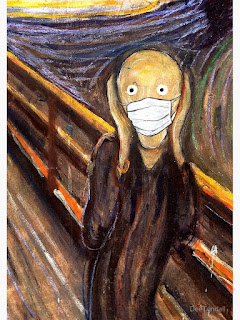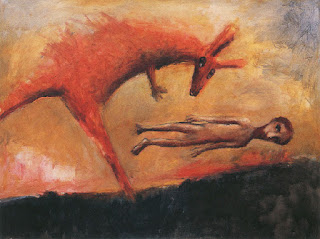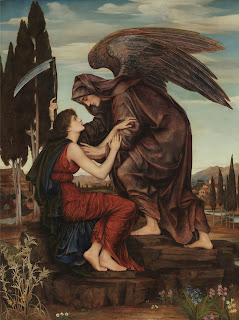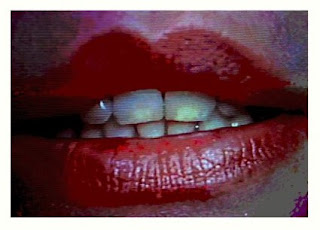I.
He had never known fear. But in England, during the coronavirus pandemic, he experienced an increasing sense of terror; not of catching the disease, but of being bullied by the malevolent spirit which arose amongst the mask-wearing, socially-distanced, lockdown-loving vaccine fanatics.
From 2020 onwards, a form of criminal insanity seemed to possess authorities around the world, including the UK government led by a pathological liar and other bottom-dog members of a Cabinet prepared to terrorise and coerce the general public in the name of health and safety.
The psychological pressure and daily propaganda - spread by a compliant media - was steadily applied in order to break the independent spirit of anyone who wouldn't toe the line and identify with the will of the majority; surrendering their reason and their rights as an individual.
Clap for the NHS and get triple jabbed: this he steadfastly refused to do. His love of freedom (and an essentially contrarian nature) made him abide by his own feelings, come what may. It was not selfishness. Or libertarian sentimentality. It was a question of integrity: would he give in to mass hysteria or not?
To be clear: he belonged to no group or cause and was not an anti-vaxxer. That is to say, he had no moral, political, or medical objection to vaccination. It was the bullying of those who exercised their right to withhold consent and defend bodily autonomy in the face of biopolitical pressure that he disliked and would never acquiesce in. But his feeling was something private and he didn't want to force his views on any other person.
A potentially lethal respiratory virus rapidly spreading around the world is horrible enough. But what made the pandemic so intolerable was that in every country almost everyone lost their heads and any sense of perspective.
The English usually pride themselves on the fact that during a crisis they keep calm and carry on with life as usual: but not this time. This time practically everyone was caught up in the hysteria and swept along, disinclined to think or feel for themselves, frightened to speak up or speak out, and - it has to be admitted - perversely enjoying the experience.
Some people fell ill. Some fell very ill. And some died. But the vast majority, their inner pride gone, just virtue signalled their way through the pandemic by demanding ever tighter restrictions on freedom, boasting of their vaccine status, and finger-wagging at those who showed the least trace of scepticism in the face of what we were being told about the virus.
And now, as we begin to face up to a post-pandemic world and learn to live with Covid, there is a tremendous price to pay because we collectively lost our heads and, worse, lost too our inward, individual integrity. We should not have lost our heads: in a time of crisis, we need to act with greater care and greater courage, but also with a greater sense of calm. And perhaps too, greater kindness.
Of course, superficially, people were kind: not least the nurses and voluntary staff at the vaccination centre where he had queued up in a mask and felt dejected and humiliated when told to stand here, go there, keep his distance, follow the markings on the floor, etc. Why was it nobody else seemed to mind?
Having had the jab, he went back home. When the time came for his second shot he would go again, but he would not allow himself to be made a fool of or infantalised; he would not, for example, wear the little badge that they gave him as if he were a six-year-old child which read: I'm a vaccine hero. 'Once,' he said to the Little Greek, 'I'm fully vaccinated, I will never obey another mandate.'
II.
Three weeks later, and he sat in A&E with a blood clot in his lower-right leg; no one wanted to say it was a side-effect of the AstraZeneca Covid vaccine - correlation is not causation - but everyone suspected as much. This led to a six-week period in which he had to inject an anticoagulant into his stomach on a daily basis. The clot eventually dissolved and the bruising faded, but the phlebitis in his leg has flared up several times since.
But inflammed veins don't hurt as much as the pain caused by the unspeakable baseness of the press and public calling for mandatory vaccination and the social exclusion of those who refuse to be jabbed or fail to provide proof of such. No one who has seen what is happening in Europe, or Australia, or been threatened with arrest by the police for sitting on a park bench or refusing to reveal the contents of their shopping trolley, can ever believe again in the benevolence of the State.
In 2020-21, the old world ended. And it wasn't coronavirus to blame, or the Chinese Communist Party; it was our own leaders who shirked their duty (in the name of following the science and perhaps secretly fantasising of a Great Reset).
If only enough individuals had kept their heads and their integrity, the pandemic would never have unfolded in the way it did. If only, in the beginning, there had been enough voices raised in opposition to lockdowns in the UK, then we wouldn't be in the mess we are in today. But the British - particularly the Welsh and the Scots - wobbled and lost their minds and the tide of horror accumulated.
And now things will never be the same again ... (Although the snowdrops will soon be out.)
Note: this post is written after (and in the manner of) D. H. Lawrence; see Chapter XII of his novel Kangaroo (1923), entitled 'The Nightmare', which details the unpleasant wartime experiences of the protagonist - Richard Lovatt Somers - who was subject to bullying authority, police harassment, and intimate medical inspection (much as Lawrence was himself).
As I have not indicated where I paraphrase, where I quote - or, if you prefer, where I borrow, where I steal - from Lawrence's text, I would encourage readers who are interested to go to the novel directly. The Cambridge Edition, ed. Bruce Steele, established from the original sources and first published in 1994, is the one I relied upon when writing this post; see pp. 212-259.
Finally, note that this post is not intended to be either a homage to or parody of Lawrence. And if I say things here which you don't agree with, well, don't allow yourself to be offended, or howl for me to be arrested or thrown out of Essex. I've not done anything to hurt you and there's really no need for personal enmity.







